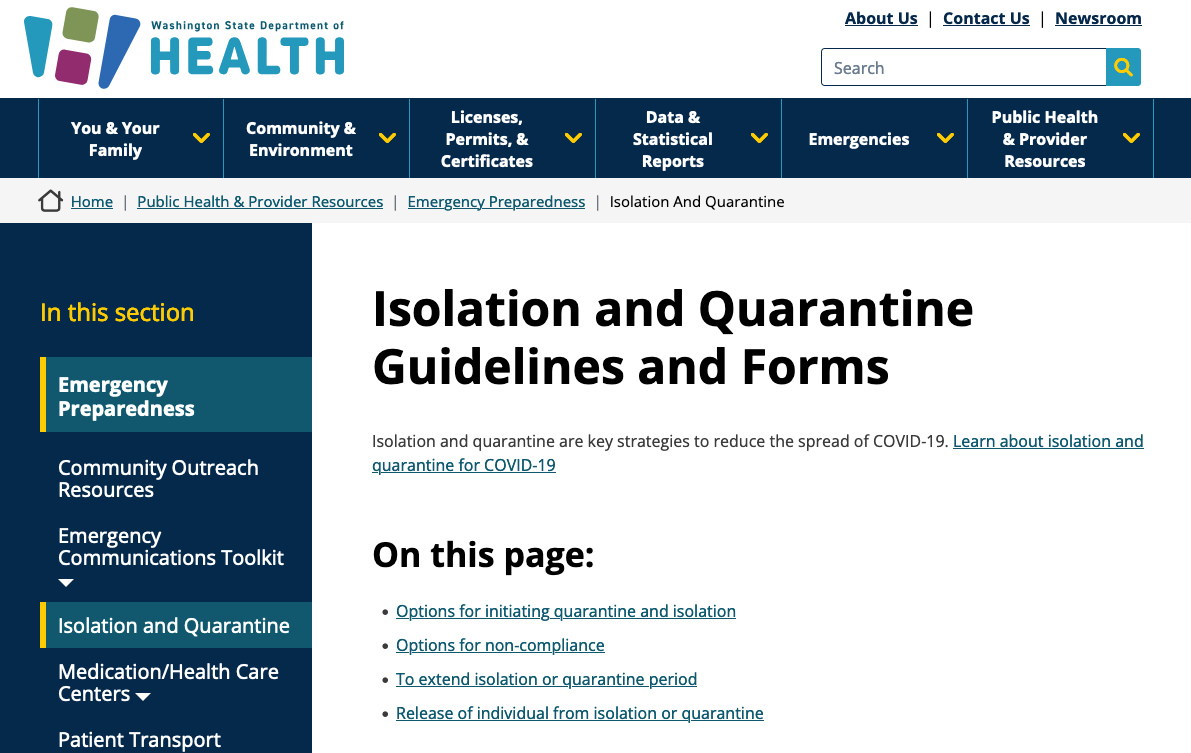Thank you for reading and sharing Bailiwick News by email and social media. To support Bailiwick with a paid subscription: Court-ordered quarantine: involuntary arrest and detention by local health and law enforcement officers.Washington state statutes, regulations, guidelines and forms.Orientation for new readers; American Domestic Bioterrorism Program; Tools for dismantling kill box anti-law A reader at Sasha Latypova's post (available for her paid subscribers this week, general readership next week)
commented with a link to a Washington State government website:
I downloaded the documents hosted at the WA-DOH site, converted them to PDFs, and provide links below for readers interested in studying them. Similar laws and administrative procedures are in place in every US state; readers are encouraged to look at your own state government websites for similar online resources. The single most important thing to understand is that no one involved in requesting voluntary detention and petitioning courts to order involuntary detention (local health officers); reviewing petitions for involuntary detention or issuing court orders (state judges); or enforcing involuntary detention orders (police, sheriffs or military officers) is legally required to review and validate health officer assertions about the existence, transmissibility and virulence (harmfulness or ability to cause disease and death) of an alleged pathogen. Detentions can be carried out without presentation of any validated evidence that a pathogen has been or can be physically isolated and identified; without any validated evidence that a pathogen has caused or can cause disease; without any validated evidence that a pathogen has been or can be transmitted; and without any validated evidence that the subject of the detention order harbors the alleged pathogen in his or her body. All evidence provided by public health officers can — legally — be fabricated and false. Washington state law (WAC 246-100-040), Procedures for isolation and quarantine, makes explicit that the non-emergency, generally-applicable procedures for detention shall be "superseded" or preempted by
In other words, even the non-substantive, inadequate due process applicable during alleged local outbreaks of alleged communicable diseases, will not apply during "health emergencies" as declared, without validated evidence, by state and federal public health officers. Washington state law provides:
In some documents, Washington public health officials distinguish isolation from quarantine by specifying "isolation is used when a person already has symptoms," implicitly but not directly stating that quarantine is the physical arrest and detention of a person who has no observable symptoms of illness. An example of the loose, non-falsifiable wording of these de facto arrest warrants is in the Petition for ex parte order authorizing involuntary detention for quarantine or isolation when voluntary quarantine or isolation refused.
Following petition by a local health officer, any state court hearing will be held ex parte, meaning without the presence or participation of the detainee and his or her lawyer, who therefore cannot provide evidence and argument disputing the "sole discretion" claims of the local health officer. Further, without establishing evidentiary standards for reasonable basis, the law provides:
Issuing the order is thus a non-discretionary act for the judge; the judge cannot substitute his judgment for the judgment of the local health officer. Petitions to the court are to be confidential, not public, ostensibly to protect the private health information of detainees and the locations of quarantine facilities but really to block the public from understanding that local and state health and law enforcement officers are secretly kidnapping and assaulting people without valid evidence, probable cause, warrants or due process. The first court order authorizes a 10-day detention, and the local health officer can apply for two 30-day extensions. Washington state law further provides that, if detainees refuse to comply with a court order directing them to submit to involuntary detention, they can be imprisoned and/or fined up to $2,000 per day for contempt of court. I corresponded recently with a reader interested in drafting habeas corpus petitions for use by people facing arrest or already detained on public health and communicable disease pretexts. I published some of the habeas correspondence on Aug. 12. There is useful information in the Washington State Department of Health forms for readers interested in drafting habeas petitions, about how state and local health officers will use state courts to enforce state-level Model State Emergency Health Powers Act (MSEHPA) laws, which their state legislatures adopted in compliance with federal public health emergency laws and bribery schemes (ie CMS Medicare/Medicaid programs), which Congress adopted to fulfill terms of UN-WHO International Health Regulations and Bank for International Settlements/Federal Reserve/Treasury financial extortion schemes. It's also important to think through, as early as possible, armed resistance exercised by American gun owners confronted at their homes and workplaces with quarantine requests and orders issued by local health officers, law enforcement officers and state judges. I advocate for people having and buying guns for two reasons. One is that I think the US military junta [PHEMCE] that has been in power since the January 2020 coup (carried out under federal public health emergency law) pays attention to purchasing patterns, and the more people they think have guns and are prepared to try to defend themselves, the more reasons given to the military leaders and the military officers who may be sent door-to-door, to pause, think and back off. The second is that the more people actually do resist in an armed way on their doorsteps, as early in the attempted arrests as possible, the higher the cost¹ of continuing the door-to-door programs, for the military and LEOs. I'm acutely aware of Catherine Austin Fitts' and many others' observation, which I’ve also made, that with enough economic and social force, the federal military and local law enforcement officers won't need to use armed force in most cases. A person who cannot spend time with family and friends who shun them, can't get into a grocery store to buy food and can't go to work, without complying, and can't obtain social support, food and shelter in some other way, will have to either die of loneliness and starvation quietly at home or homeless, or comply and be sickened, sterilized or killed by 'medical countermeasures.' The likelihood of a courageous sheriff or judge showing up, and using legal principles to not arrest people, or to release people from detention, is very small. The incentives for law enforcement officers and judges to cooperate with the federal military dictatorship are all in place, as are the disincentives for them to resist, and incentives and disincentives have been amply demonstrated to them for the last four years. I also think it's worthwhile to write and publish solid and short habeas templates, as long as they accurately convey the kill box information and don't pretend that the kill box laws are not in place, because every time someone reads such habeas petitions, considers the implications, thinks through trying to use them in an arrest scenario and then attempts to use them, more people become able to better see the kill box laws themselves, the underlying scientific, medical and other frauds, and Congress and the state legislatures as the source of the illegitimate, federal military HHS-CDC-DoD and local health officer authority and also the locus of repeal potential. Preparing and distributing template habeas petitions is another form of public education, and if armed arrest scenarios start to play out, some number of people who have not been paying attention will start paying attention. Being prepared to give them a very quick orientation to the post-Constitutional military dictatorship, as already established, is useful. Don’t test, don’t trace, don’t mask, don’t isolate, don’t vaxx. And don’t voluntarily go to any secondary location suggested by any kidnappers clothed in public health or law enforcement uniforms and citing public health laws.
Pray the Rosary. Quarantine law and state-level public health emergency law reporting and analysis:
Washington State Department of Health, Public Health Provider Resources, Emergency Preparedness, Isolation and Quarantine, Guidelines and Forms:
1 Aleksandr I. Solzhenitsyn , The Gulag Archipelago: “And how we burned in the camps later, thinking: What would things have been like if every Security operative, when he went out at night to make an arrest, had been uncertain whether he would return alive and had to say good-bye to his family? Or if, during periods of mass arrests, as for example in Leningrad, when they arrested a quarter of the entire city, people had not simply sat there in their lairs, paling with terror at every bang of the downstairs door and at every step on the staircase, but had understood they had nothing left to lose and had boldly set up in the downstairs hall an ambush of half a dozen people with axes, hammers, pokers, or whatever else was at hand?... The Organs would very quickly have suffered a shortage of officers and transport and, notwithstanding all of Stalin's thirst, the cursed machine would have ground to a halt! If...if...We didn't love freedom enough. And even more – we had no awareness of the real situation.... We purely and simply deserved everything that happened afterward.” All content is free to all readers. All support — reading, sharing and financial — is deeply appreciated. |


No comments:
Post a Comment